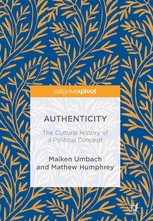Authenticity

This project led to the publication of ’Authenticity: a Cultural History of a Political Concept' in 2018. Authenticity is everywhere: political leaders invoke the idea to gain our support, advertisers use it to sell their products. But is authenticity a dangerous hoax? What is, and is not, authentic has been hotly debated ever since the concept was invented. Many academics have sought to "unmask" authenticity claims as deceptive. This research takes a different approach.
In chapters covering historical and contemporary examples, we explore why authenticity, real or imagined, exercises such a powerful hold on our imaginations. Examples of appeals to authenticity include the idea that we can learn how to live through understanding the natural world and humanity’s please in it, or that individuals should integrate with a communal form of life. We also look at the ides of ’inauthenticity’ and what it means to live an inauthentic life, before moving on to look at appeals for the restoration of authenticity in popular accounts of leadership, and through our lives as consumers.
Our research traces how invocations of authenticity borrow from one another, across time and place, in arenas such as philosophy and theology, encounters with nature, leisure, and mass consumption, political and corporate leadership, and both left-wing and right-wing ideologies.